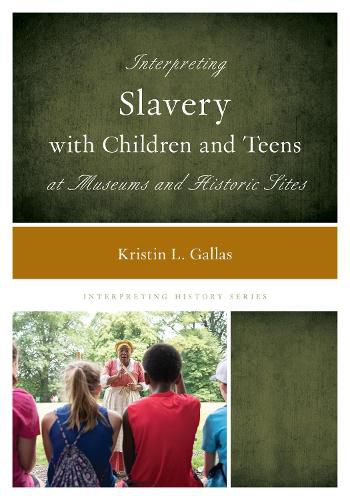Readings Newsletter
Become a Readings Member to make your shopping experience even easier.
Sign in or sign up for free!
You’re not far away from qualifying for FREE standard shipping within Australia
You’ve qualified for FREE standard shipping within Australia
The cart is loading…






Interpreting Slavery with Children and Teens offers advice, examples, and replicable practices for the comprehensive development and implementation of slavery-related school and family programs at museums and historic sites. Developing successful experiences-school programs, field trips, family tours-about slavery is more than just historical research and some hands-on activities. Interpreting the history of slavery often requires offering students new historical narratives and helping them to navigate the emotions that arise when new narratives conflict with longstanding beliefs. We must talk with young people about slavery and race, as it is not enough to just talk to them or about the subject. By engaging students in dialogue about slavery and race, they bring their prior knowledge, scaffold new knowledge, and create their own relevance-all while adults hear them and show respect for what they have to say.
The book’s framework aims to move the field forward in its collective conversation about the interpretation of slavery with young audiences, acknowledging the criticism of the past and acting in the present to develop inclusive interpretation of slavery. When an organization commits to doing school and family programs on the topic of slavery, it makes a promise to past and future generations to keep alive the memory of long-silenced millions and to raise awareness of the racist legacies of slavery in our society today.
$9.00 standard shipping within Australia
FREE standard shipping within Australia for orders over $100.00
Express & International shipping calculated at checkout
Interpreting Slavery with Children and Teens offers advice, examples, and replicable practices for the comprehensive development and implementation of slavery-related school and family programs at museums and historic sites. Developing successful experiences-school programs, field trips, family tours-about slavery is more than just historical research and some hands-on activities. Interpreting the history of slavery often requires offering students new historical narratives and helping them to navigate the emotions that arise when new narratives conflict with longstanding beliefs. We must talk with young people about slavery and race, as it is not enough to just talk to them or about the subject. By engaging students in dialogue about slavery and race, they bring their prior knowledge, scaffold new knowledge, and create their own relevance-all while adults hear them and show respect for what they have to say.
The book’s framework aims to move the field forward in its collective conversation about the interpretation of slavery with young audiences, acknowledging the criticism of the past and acting in the present to develop inclusive interpretation of slavery. When an organization commits to doing school and family programs on the topic of slavery, it makes a promise to past and future generations to keep alive the memory of long-silenced millions and to raise awareness of the racist legacies of slavery in our society today.